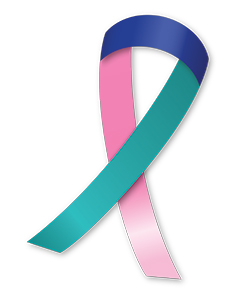 It's not a cancer that typically makes headlines. But it's important to learn the facts about thyroid cancer because more and more people are being diagnosed with the disease. In fact, it's the most rapidly increasing cancer in the U.S. Here are five things to know about it.
It's not a cancer that typically makes headlines. But it's important to learn the facts about thyroid cancer because more and more people are being diagnosed with the disease. In fact, it's the most rapidly increasing cancer in the U.S. Here are five things to know about it.
1. It's most common in women, and it occurs at a younger age than most other adult cancers. More than three out of four people diagnosed with thyroid cancer are women. Nearly two out of three cases of the disease are in people younger than 55. And though rare, children and teens can get thyroid cancer too.
2. It's often found when a doctor is doing a routine checkup and feels a lump in a patient's neck, or it's discovered during an imaging test-such as an ultrasound or CT scan of the neck-for other health problems. You should always tell your doctor if you feel a lump in your neck or see swelling, two possible signs of thyroid cancer.
3. There are four main types of thyroid cancer:
• Papillary. This is, by far, the most common kind of thyroid cancer. It starts in follicular cells, which use iodine from the blood to make thyroid hormones. This cancer usually grows slowly, but often spreads to nearby lymph nodes.
• Follicular. This type also starts in follicular cells. It doesn't often spread to lymph nodes, but it can spread elsewhere in the body.
• Medullary. This is a rare type of the disease that starts in cells known as C cells. Occasionally, it spreads before problems are discovered in the thyroid itself.
• Anaplastic. Rarer yet, this is a fast-growing, quickly spreading cancer that tends to be difficult to treat.
4. Surgery to remove all or part of the thyroid gland is the main treatment. People who are treated with surgery for papillary, follicular and medullary cancers must take daily medication to replace the hormones the thyroid used to make.
Sometimes, treatment for papillary and follicular thyroid cancers also includes a type of radiation therapy called radioactive iodine, which is given in liquid or pill form. Thyroid cancer cells that remain in the body after surgery absorb the radioactive iodine and are destroyed.
5. Generally, long-term prognosis is excellent. About 98 percent of patients with thyroid cancer live five years or longer after their diagnosis. Even when the disease spreads to nearby lymph nodes, most people do well.
Sources: American Cancer Society; American Society of Clinical Oncology; EndocrineWeb